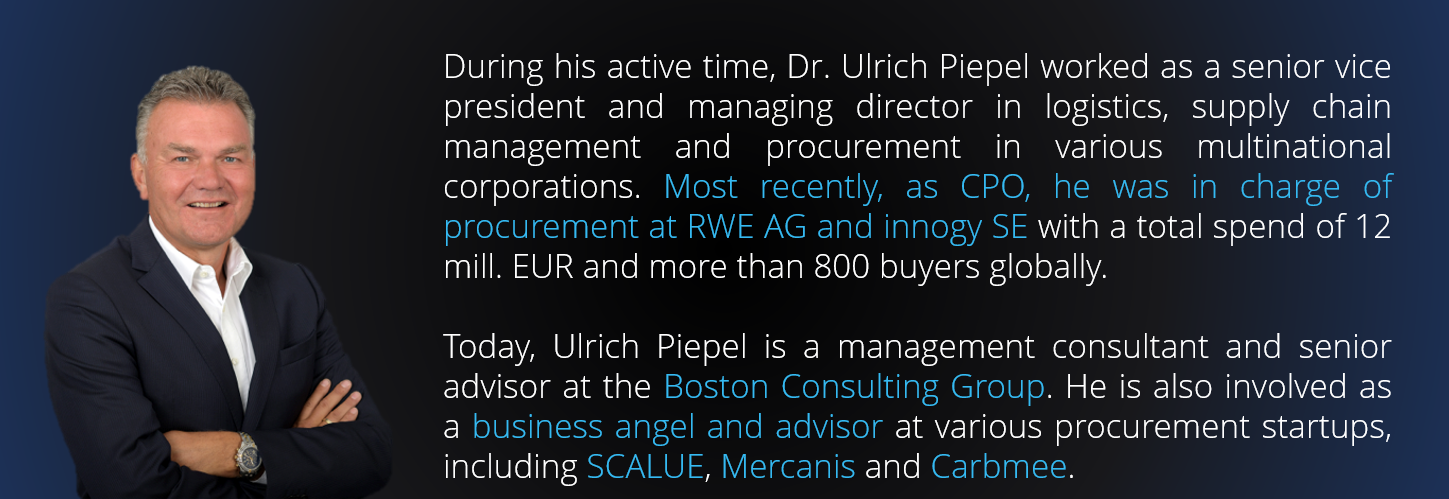Existing customer? Login
Interview
January 11th, 2023
Interview with Dr. Ulrich Piepel - Part 1
 Thomas Teichmann
Thomas Teichmann
Maverick buying still poses major problems for many procurement departments today - and mostly unnoticed. We talked with Dr. Ulrich Piepel, former CPO of RWE AG and innogy SE and today consultant and business angel for digital procurement, about his view of "wild procurement". He also gives us deep insights into his time as head of procurement (CPO) for several large corporations and dares to take look with us a at the future megatrends in the industry.

More information about this person
Dr. Piepel, the focus of today's interview is on the subject of Maverick Buying, also known as "wild procurement". From your point of view as a long-time CPO and head of procurement: what are the dangers of maverick buying in a company?
There are quite a few if you ask me. The greatest danger is that the procurement department cannot develop its professionalism properly because some other departments act without the involvement of the procurement department. As a result, deals that are far too bad for the company are often concluded, the tender is not properly advertised or there is no real competition, and millions of Euros or more are left on the street. This still applies to many companies today, whether large or small; in this respect “Maverick Buying” is still an important topic.
By the way, do you know where the origin of the term “Maverick Buying”? The term Maverick originates from the cattle breeder Samuel Maverick (1803-1870) in Texas, who, among his other claims to fame, was known for not branding his cattle, as the legend goes. So a Maverick describes a person who thinks and acts independently and often behaves differently than expected or in a way that is considered normal: autonomously, as a renegade, solitary. In terms of the procurement process, Maverick Buying could therefore be referred to as “uncontrolled spend or procurement”.
Despite this, maverick buying still occurs in many companies. How can that actually be?
I would like to state one thing in advance: Procurement is an essential operational department in every company. And procurement is not a service function, as many like to say, but focuses on adding value to the company and supporting the other functions. Contrary to my personal assessment, however, procurement is still often greatly undervalued. In addition, procurement is not an easy topic either, and yet the departments always try to do things quickly and independently. True to the motto: Anyone can shop, we also do it professionally in our private lives.
Accordingly, in many cases, the departments also believe that they can easily buy independently, since procurement only makes things unnecessarily complex anyway. But what many do forget: You need a lot of know-how and experience to be able to buy properly and professionally. Unfortunately, however, in many companies there are a large number of procurement activities that continue to bypass procurement and go completely unnoticed. Such wild procurement or Maverick Buying is of course disastrous, I know that only too well from my own experience.
From your time at RWE, for example?
When I started at RWE as CPO, we also carried out very soon the first maverick buying measurements. Depending on the individual subsidiary and region, we were in the range of 10 to 20% of the procurement volume, which bypassed the procurement department. Through concrete measurements and subsequent discussions with the departments concerned, we were then able to gradually reduce the maverick buying volume to the per thousand range. It still applies: If you don't measure Maverick Buying, you can't prevent it either.
So good measurement in procurement is essential to identify and prevent maverick buying?
A note in advance. What would the marketing department say if production suddenly took care of marketing on their own? Or does the legal department take over the financing of the company? That would certainly result in immediate reactions from the management and subsequent terminations for those responsible. In procurement, however, this does not lead to consequences in many cases. In this respect, from a procurement perspective, it is an extremely important point to get the whole subject of "Maverick Buying" under control in order to show company-wide: We are the procurement department and we are rightly responsible for the professional procurement of all product groups in this company on a group wide level.
Therefore, every CPO has to take matters of maverick buying into their own hands and prosecute violations. I like to compare the fight against maverick buying in procurement with the police, who are supposed to prevent offenses and crimes without any equipment. For example, if a police officer doesn't have a radar device, they don't know who is speeding; and then you are relatively ineffective as a police officer on the street. The same applies to the topic of maverick buying in the company. Unfortunately, there is hardly any software that automates the measurement of Maverick Buying. In the past, we did always use SAP in our company and, like so many other competitive products, this software simply does not provide any key figures on maverick buying. In order to combat wild procurement, you have to measure it first. And that is not so easy without data management and software and usually involves a relatively high amount of effort.
Why is maverick buying so difficult to measure without software?
To explain this in a little more detail: Everything that is bought in a company without procurement logically does not even appear in the materials management and procurement systems. The reason for this is that in these cases the specialist departments usually simply order by free text, by fax or by telephone. For procurement this means, you first have to compare the orders that have actually been placed with the total invoice volume of all suppliers. Here you can see, for example, that a supplier has an invoice volume of 3 million, but only one million in the procurement system. And then you know: Aha, 2 million missed the purchase. In order to find out all this, you have to compare and analyze tables and spread sheets with each other, which is quite time-consuming. And that is not an easy task, especially for large companies with thousands of suppliers in numerous countries.
Couldn't this task simply be taken over by software like SCALUE?
Great question, because SCALUE has a standard function for exactly this problem. To calcite this data, the software simply pulls the two data fields mentioned above from the ERP system, compares them and then automatically evaluates what has not been handled by the procurement department. In this respect, the introduction of SCALUE is worthwhile just for measuring Maverick Buying. Let's just assume that a company has a maverick buying rate of 10% with a procurement volume of EUR 1 billion. Then that corresponds to 100 million euros that go past procurement and where large amounts could be saved quickly and efficiently through targeted and professional negotiations. Almost nowhere else can you find a faster return on investment (ROI) when introducing software.
You would like to know how SCALUE could help to optimize your procurement?
In what other forms is Maverick Buying expressed in the company?
Of course, it can also happen that procurement was not involved in the process itself, but then receives an order or invoice at a later point in time. In such a case, procurement must then create an order so that accounting can actually assign the transaction to an order. Some people say that's not really maverick buying since there exists a purchase order now; however, this is nonsense. The same applies, by the way, if the procurement department is only involved when the department has already negotiated everything and the procurement department is only executing the order.
But I probably won't be able to uncover such processes without the right measurement, right?
Absolutely. Unfortunately, it is mostly the case that the early involvement of procurement is simply not measured enough or not at all. Most companies do not even have a KPI for this. Also, from my point of view, it is also important that finance accepts and does understand the measurement methodology in procurement and that the results are also accepted by internal audit.
Why do you see this as an important addition?
I think that's obvious. If I do not have the key indicators in procurement confirmed by the relevant departments, how is the procurement manager supposed to be able to implement his goals and targets in a way that is accepted throughout the company? In addition, a procurement manager should also report in which departments ‘Maverick Buying’ has occurred. Only then can these deviations be addressed directly and those responsible held accountable.
Now we have covered the monetary dangers, the implications and the importance of measuring ‘Maverick Buying’ in detail. But what we have not even discussed yet is the impact of ‘Maverick buying’ on the reputation of procurement. What is your opinion on that?
The maverick buying metric has two sides: The first side is the acceptance of the procurement department within the corporation. A high maverick buying rate can also indicate poor performance or acceptance of the procurement department. Namely when the internal department is not satisfied with the performance of the procurement department from a subjective point of view. Procurement should question itself critically here. From my experience, however, this criticism should generally only affect individual buyers or individual product groups. This can be remedied by training, new hires or regular monthly meetings with the specific department
On the other hand, maverick buying represents an unprofessional and unacceptable attitude on the part of the department performing maverick buying. And no head of procurement or CPO is well advised to tolerate these excesses in maverick buying, because then procurement loses its standing and credibility in the entire company.
In the second part of the interview, we talk to Dr. Ulrich Piepel about his experiences as a purchasing manager for various large corporations and what practical tips he can give procurement managers.
You can read the second part of the interview here

How SCALUE can help you? Schedule a free demo now!
Learn more on our blog: Get More Insights
Follow us on LinkedIn: Get more Content